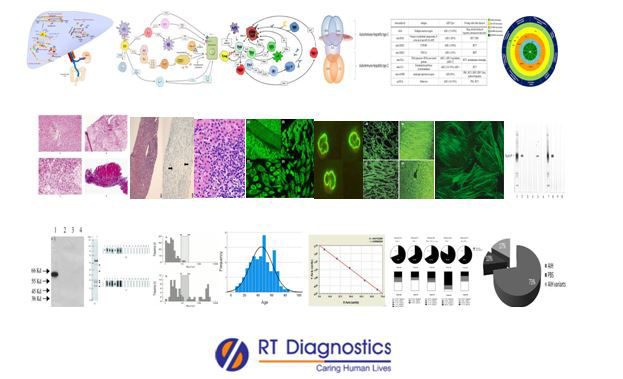Soluble Liver Antigen -SLA:
Why Soluble Liver Antigen - SLA Test?
CLINICAL INFORMATION
In invertebrates, the liver is one of the major organs (accessory digestive organ – eg. it produces bile for the digestion of fat) that performs most essential biological functions. The liver is a reddish-brown, wedge-shaped organ with two lobes. It is located in the upper right quadrant of the abdominal cavity below the diaphragm in human beings. The liver contains specialized cells called as hepatocytes which help in many vital metabolic processes. The liver performs vital physiological functions such as protein synthesis, helps in digestion (secretes digestive juices – secretory function), xenobiotic – helps in detoxification, glycogen storage, helps in metabolism and growth etc. soluble liver antigen is an enzyme (seleno-cysteinyl tRNA synthetase). SLA appear to be directed against the UGA-suppressor tRNA associated protein. Moreover, the findings of anti-SLA have been associated with increased prevalence of mainly HLA-DR3 and HLA-DR4 genotypes to a lesser extent. These antibodies are highly specific for auto-immune hepatitis. These antibodies against the soluble liver antigen are known to be associated with AIH-type1 (also referred to as classic, active chronic, lupoid, plasma cell or autoimmune chronic active hepatitis etc), associated with biliary cirrhosis. Soluble liver antigen test aims to characterize anti-soluble liver antibodies in a patient’s blood infected with hepatitis C virus, primary biliary cirrhosis etc. Another closely associated pathology is known as cryptogenic hepatitis (characterizes as undefined chronic hepatitis without the presence of antibodies to either viral hepatitis and/or conventional profile of auto-immune markers). Type-1 AIH is known to be connected with other autoimmune disorders such as celiac disease, rheumatoid arthritis, ulcerative colitis etc. The cause includes viral, toxic, genetic, metabolic causes etc. High-risk factors to develop autoimmune hepatitis are exposure to certain infectious diseases such as measles, herpes simplex virus, Epstein-Barr virus etc. Symptoms of poor liver function include nausea, vomiting, chronic fatigue, dark urine pale stool, abdominal pain and swelling, edema (swelling of ankle and legs), jaundice etc. Risk factors for autoimmune hepatitis are medications such as minocycline, nitrofurantoin, hydralazine, methyldopa, statins, fenofibrate, infliximab, etanercept, interferon – α and β etc. Some of the clinical manifestations of autoimmune hepatitis are elevated liver enzymes in the bloodstream like ALT, AST etc, jaundice, reduced liver function, and presence of autoantibodies LKM1 into-antibodies, anti-smooth muscle antibodies (SMA), anti-nuclear-antibodies (ANA) etc. Additional tests for autoimmune hepatitis such as antibody detection (ELISA Test) for anti-liver-kidney microsomal antibodies, liver-pancreas antigen, antibodies against a liver-cytosol antigen, anti-smooth muscle antibody (antibodies directed against either actin component and/or non-actin component), anti-mitochondrial antibody, anti-nuclear antibody, peri-nuclear and anti-neutrophilic antibodies etc. Other tests include detection of hepatitis virus (A, B, C etc) to rule out viral hepatitis, screening for jaundice, LFT, liver enzyme markers like AST, ALT, studies on immunohistochemistry, imaging studies, western blot, immunoprecipitation assay (based on recombinant cDNA) etc.

General Instructions:
Sample Requirement: Specimen - Blood sample collected from the vein. Test Preparation: None.
NOTE - Sample for specimen collections may vary based on the patient’s condition/cases according to the patient’s presenting complaints/signs or symptoms:
SPECIMEN REQUIREMENT (Special or Rare Cases) - As instructed and guided by Physician / Clinician / Pathologist / as per Laboratory’s requirements, according to procedures and protocols.
This Multi-Specialty Clinical Referral Laboratory RT DIAGNOSTICS provides precise and accurate tests with an extensive range of testing services to the medical centres to help in the diagnosis and identification of pathology in the test specimens for infectious diseases and also to evaluate the function of organ systems of the patient. It prevents further complications and helps to stabilize and restore health to near normalcy at the earliest without delay.



